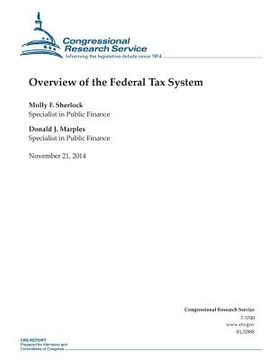Reseña del libro "Overview of the Federal Tax System (en Inglés)"
The major sources of federal tax revenue are individual income taxes, Social Security and other payroll taxes, corporate income taxes, excise taxes, and estate and gift taxes. This report describes the federal tax structure, provides some statistics on the tax system as a whole, and presents analysis of selected tax concepts. The federal income tax is levied on an individual's taxable income, which is adjusted gross income (AGI) less deductions and exemptions. Tax rates, based on filing status (e.g., married filing jointly or single individual) determine the level of tax liability. Tax rates in the United States are progressive, such that higher levels of income are taxed at higher rates. Once tax liability is calculated, tax credits can be used to reduce tax liability. Tax deductions and tax credits are tools available to policymakers to increase or decrease the after-tax price of undertaking specific activities. Individuals with high levels of exemptions, deductions, and credits relative to income may be required to file under the alternative minimum tax (AMT). Corporate taxable income is also subject to varying rates, where those with higher levels of income pay higher levels of taxes. Social Security and Medicare tax rates are, respectively, 12.4% and 2.9%. In 2014, Social Security taxes are levied on the first $117,000 of wages. In 2015, the Social Security wage base is inflation-adjusted to $118,500, reflecting increases in average wages in the economy. Medicare taxes are assessed against all wage income. Federal excise taxes are levied on specific goods, such as transportation fuels, alcohol, tobacco, and telephones. In FY2013, individual income taxes accounted for 47% of total federal revenue. Social Security taxes accounted for 34%. Corporate income taxes accounted for 10% while excise taxes accounted for 3%. Estate and gift, customs, and miscellaneous taxes accounted for the remaining 6% of total revenue. Over time, the corporate income tax has become much less important as a revenue source while Social Security taxes have provided a larger share of total revenues. Analysis of tax statistics from the federal tax system as a whole leads to three conclusions: (1) federal revenue as a percentage of GDP is in line with historical trends; (2) the U.S. fiscal position is in line with the fiscal position of other industrialized nations (revenues and expenditures as a percentage of GDP are relatively low); and (3) over the past decade, average tax rates have fallen for individuals at all income levels, but have fallen more for lower-income individuals, reducing their share of overall tax liabilities. The final sections of this report analyze a number of tax concepts. Tax expenditures are revenue losses from special tax deductions, credits, and other benefits. Capital gains warrant special attention, as there is debate about their being taxed at a lower rate. Marriage tax penalties and bonuses, while reduced following legislation enacted in 2001 and 2003, still pose an inequity in the tax system. Tax deferral, or the timing of taxes, poses problems related to the timing of taxation, specifically with respect to capital gains. Depreciation is important, as accelerated depreciation schemes or expensing can influence firm behavior. Tax liability also depends on form of business organization. Finally, the issue of whether taxes can influence firms' competitiveness is reviewed.

